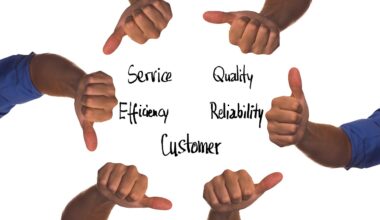Best Practices for Seamless Email Marketing and CRM Integration
Successful integration of email marketing and CRM necessitates a clear strategy. Start by defining your target audience effectively. Knowing who your customers are helps establish more personalized content and relevant offers. This identification process can be enhanced through segmentation. Segmenting your audience allows for tailored communications, ultimately leading to higher engagement rates. Secondly, ensure data consistency across platforms. Common issues arise from discrepancies in customer data between CRM systems and email marketing tools. A reliable and up-to-date database is key to creating more effective campaigns. Regularly review your data to eliminate outdated contacts or information. Additionally, prioritize automation to streamline repetitive tasks. Automated emails based on customer behavior can result in timely messages that resonate with recipients. Another essential practice is to test and analyze your email campaigns continuously. Utilize A/B testing to determine what content engages your audience best, leading to higher conversion rates. }
Furthermore, utilizing analytics is crucial to gauge the success of your campaigns. By closely monitoring metrics such as open rates and click-through rates, you develop valuable insights into customer behavior and preferences. This data informs future campaigns, enhancing their effectiveness and ROI. Consider also the importance of mobile optimization; many customers access emails via smartphones. Ensuring that your campaigns are mobile-friendly enhances readability and user experience. Familiarizing yourself with compliance regulations, such as GDPR, is equally vital. Making sure that your email campaigns respect privacy laws builds trust and keeps your business compliant. Another valuable practice is fostering customer relationships through feedback. Encourage clients to provide feedback after receiving emails, which helps you tailor future communications more effectively. This engagement can foster loyalty, making customers feel involved in your brand’s evolution. Ultimately, by integrating these best practices, your email marketing initiatives will flow more smoothly with your CRM system, leading to effective customer outreach and retention strategies. Consistent optimization and attention to detail guarantee successful engagement and lasting relationships with customers, underlining the importance of a well-coordinated approach. }
Leveraging the Right Tools for Integration
Choosing the right tools for email marketing and CRM integration is essential for success. An effective integration platform can significantly enhance the flow of information between systems, ensuring that data is synchronized in real time. Look for tools that offer API capabilities, enabling seamless data transfer. Prioritize platforms with comprehensive features, allowing you to manage contacts, campaigns, and analytics from a single interface. Furthermore, ensure that the tool offers templates for email communication, making it easier to create visually appealing content. This means less time spent on design and more focus on strategy. Tools with robust reporting functionality are equally important; access to detailed analytics allows you to understand campaign performance and effectiveness. Additionally, remember to evaluate customer support services. A responsive support system can be invaluable during integration difficulties or upgrades. Learning resources and community forums also enhance your user experience. By investing time into selecting appropriate tools, your integration efforts will yield an efficient framework for blending email marketing with CRM solutions seamlessly. A proactive approach to tool selection lays the groundwork for future marketing initiatives.}
When it comes to data management, ensuring high levels of data hygiene is paramount. Data hygiene involves regularly cleaning up your email lists to eliminate duplicates and outdated information, thus maximizing the efficacy of your marketing efforts. Establish protocols for data entry, ensuring that all relevant customer information is consistently captured at the point of contact. Consistently updating your CRM system guarantees that your email campaigns are targeted and relevant. Furthermore, having clear permission-based email practices aligns your efforts with regulatory requirements while fostering customer goodwill. Always solicit explicit consent from individuals before adding them to your mailing list, emphasizing transparency. This builds trust and increases the likelihood of engagement. Implementing double opt-in processes can double-check subscribers’ interest in your content. Using targeted, permission-based approaches empowers customers with control over their interactions with your brand. Ultimately, prioritizing data hygiene ensures your messaging is relevant and welcomed. It not only supports compliance but also enhances customer satisfaction. Healthy data forms the backbone of successful email marketing efforts aligned with your CRM strategy. Investing in these practices paves the way for effective communication and customer loyalty.}
Creating Engaging Content
Crafting engaging content for your email communications plays a pivotal role in the success of your CRM integration strategy. Ensure that your messages are informative and tailored to individual customer needs. Personalized emails yield higher open rates, and engaging content encourages recipients to take action. Use captivating subject lines to entice readers and prompt them to read further. Incorporating visuals like images and infographics can elevate your messaging, making it more digestible and appealing. Additionally, consider incorporating storytelling into your emails, fostering deeper emotional connections with customers. Using relatable narratives can capture interest and encourage customer interactions. Further, maintaining a consistent brand voice enhances recognition and builds trust, encouraging loyalty. Including clear call-to-action buttons helps guide readers toward your desired outcome, whether that involves making a purchase, signing up for a webinar, or visiting your website. Testing different content types, formats, and offers will reveal what resonates best with your audience, enabling continuous improvement of your campaigns. Ultimately, compelling content backed by valuable insights creates strong links between your email marketing and CRM systems, enhancing customer relationships.}
Furthermore, maintaining a regular email schedule is essential for keeping your audience engaged over time. Regular communication reinforces brand presence in the minds of your customers, encouraging ongoing interactions. However, be mindful not to overwhelm your audience with excessive emails. Striking the right balance is crucial; emails should be frequent enough to keep your brand top-of-mind but not so frequent that they become bothersome. Establishing a content calendar can ensure consistency in your outreach and help you plan effectively. This foresight allows you to time emails around product launches, holidays, or relevant events, maximizing their impact. Analytics gathered from previous campaigns can guide scheduling efforts, identifying optimal sending times to improve engagement rates. Don’t forget to segment your audience further based on engagement levels and preferences in this process. By tailoring messages according to these distinctions, you enhance their relevancy and effectiveness. Regularly reassessing engagement metrics also promotes continuous improvement, ensuring your email strategies evolve alongside customer behaviors and preferences. Ultimately, a well-planned email schedule proves beneficial in bridging your email marketing and CRM efforts, creating opportunities for stronger customer connections.
Measuring Success and Continuous Improvement
To truly optimize the integration of email marketing with your CRM, establishing clear metrics is vital. You, as marketers, need to decide which key performance indicators (KPIs) exhibit the overall effectiveness of your campaigns. Common metrics include open rates, click-through rates, conversion rates, and unsubscribe rates. By assessing these metrics regularly, you gain critical insights into your audience’s response to your content, guiding necessary adjustments. Benchmarking these metrics against industry standards also provides context for your performance, highlighting areas for improvement. Additionally, leveraging customer feedback can illuminate specific pain points or opportunities within your campaigns. Surveys or polls can be sent occasionally in relation to upcoming products or preferences, giving customers a voice in shaping your offerings. Regularly analyzing these insights reinforces a culture of continuous improvement, where adaptation becomes second nature. Acknowledge that email marketing strategies must evolve, particularly given rapidly changing consumer behaviors and preferences. Ultimately, consistent measurement and analysis ensure you maximize your email marketing and CRM integration, driving sustained customer engagement and improving retention rates through strategic and informed decisions.}
Finally, ensure that your team receives appropriate training on the tools and strategies employed in your marketing and CRM efforts. Investing in skill development empowers your team to leverage integrations fully, maximizing potential gains. Focus training on the latest trends in email marketing as well as best practices, equipping your marketing team to respond effectively to shifts in customer expectations. Encouraging collaboration between marketing and sales teams ensures a united approach to outreach efforts, highlighting shared objectives and reducing conflicting messages. Furthermore, hosting regular workshops or team meetings can foster knowledge sharing, enabling team members to stay updated on emerging tools or tactics. Promote an adaptive mindset, ensuring your teams embrace experimentation with new strategies and are open to feedback. This culture of growth and innovation translates into your marketing efforts, enhancing customer relationships. Ultimately, a well-trained team that understands the intricacies of email marketing and CRM integration will yield significant rewards in terms of engagement and conversions. By implementing these nurturing practices, you facilitate ongoing development, creating a dedicated team ready to tackle market challenges effectively and with confidence.


